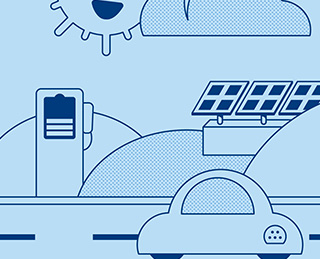Our approach is to significantly reduce the climate-relevant emissions caused by our business operations and resulting from our supply chain as well as to decrease our consumption of natural resources1. We do this by focusing on behavioural change (Energy Awareness Programme) and investment aimed at increasing our energy and resource efficiency (Energy Saving Programme). We also operate a global energy management system that identifies potential savings in our stores and monitors our overall savings targets.
In financial year 2021/22, electricity consumption in our METRO stores increased by 0.1% in comparison to financial year 2020/21. Overall, however, it was lower than the 0.4% increase in consumption expected in view of Covid-19 and the sCore growth strategy. Furthermore, we are also converting our cooling systems to natural refrigerants (F-Gas Exit Programme), insofar as it is possible. This reduces our energy requirements as well as our costs. In total, we invested €61.1 million in the so-called F-Gas Exit Programme. In financial year 2021/22, we also invested €15.4 million in the METRO Energy Saving Programme. This will save us approximately €5.4 million in energy costs annually.
Examples of measures in the overall area of environmental matters in the reporting period are:
- New refrigeration systems using natural refrigerants, primarily transcritical ejector refrigeration plants, were commissioned in 19 countries, including in Germany, Hungary, Kazakhstan, Poland and Portugal.
- In Bulgaria, we also spent 2.1 million euros on the installation of LED and sliding door systems at 11 stores.
- 14 additional photovoltaic plants were installed in France, India, Hungary, the Netherlands and Spain with a total additional capacity of 6,397 kWp.
- Additional charging stations for electric vehicles of METRO customers were installed at wholesale stores in France, Slovakia and Spain, among others, as well as at the Lahore wholesale store in Pakistan and in Bangalore, India. In Moldova, Poland, Portugal, Slovakia and Hungary, all METRO wholesale stores are now equipped with charging stations. We now have a total of 812 charging locations. At the Düsseldorf Campus, more than 347 employees already use electric vehicles as company cars, whose emissions are offset by certificates for hydroelectric power plants. In total, 748 company cars are powered by electricity or hydrogen, which is about 10% of our total vehicle fleet.
- Our logistics fleet has 12 trucks fuelled with liquefied natural gas. The EV fleet has not been expanded. Thus, a total of 25 commercial vehicles are either electric or powered by liquefied natural gas (LNG/CNG).
METRO uses an internal CO2 price of €50 per tonne of CO2, mainly to approve energy-efficient projects with lower financial savings. METRO is a member of the Task Force on Carbon Pricing in Europe, which aims to put a price on all relevant carbon emissions and thus achieve market- and competition-based decarbonisation. In addition, we carried out a climate change scenario analysis based on the Task Force on Climate-related Financial Disclosures (TCFD) method for the local and international supply chain of vegetables in the 2020/21 reporting period.
This is METRO’s response to risks identified in initial scenario analyses – as recommended by TCFD – in our business operations as well as in our supply chain:
- Physical risks resulting from extreme weather events and water stress (scarcity or flooding)
- Risks of business interruptions due to extreme weather events and risks caused by declining economic power
- Transition risks such as rising prices for CO2 emissions (with short-term impact on costs and product prices)
- Risks of resource scarcity and associated price increases (for example, for agricultural products in the next 5 to 10 years)
- Risks caused by investments in new technologies (carbon-neutral cooling units planned worldwide until 2030) and investments in the generation of renewable energies (extensive installation of solar systems planned until 2030)
We incorporate these risks in our medium-term risk management and assess risks for sales and costs, particularly those based on rising prices and decreasing availability of resources, taking social concerns into account. No reportable risks as defined in § 289c Section 3 Sentence 1 Nos. 3 and 4 of the German Commercial Code (HGB) were identified.
Other key topics in relation to resource-efficient business operations are the prevention of waste, the recovery and recycling of waste materials and the reduction of water consumption.
Compared to the previous year, the volume of waste (excluding food waste) increased by 9.1%. Water consumption decreased by 3.1% compared to the previous year.
Overall, we have already met our target of saving 5% water compared to 2016/17. Therefore, METRO set a new water savings target in financial year 2021/22: By 2030, specific water consumption in its own business operations is expected to be reduced by 10% per square metre of net operating area compared to the base year 2020/21.
Reduction of food waste
In line with the Consumer Goods Forum (CGF) resolution on food waste, we are committed to reducing food waste in our operations (per square metre of sales and delivery area) by 50% by 2025 compared to the baseline year 2017/18. We measure, monitor and report progress in line with the requirements of the Food Loss and Waste (FLW) protocol.
We are tackling food waste comprehensively, with a 5-pillar strategy from farm to table: (1) Dedication to the upstream supply chain, (2) food waste reporting, (3) food waste solutions, (4) partner and customer engagement, and (5) stakeholder engagement.
Key initiatives are helping us achieve our goal:
- In 21 countries and service units, we work with food bank organisations to pass on unsold food to those in need. In 3 countries, we are working with TooGoodToGo to accomplish this goal. In financial year 2021/22, the dedicated collaboration has ‘saved’ more than 121,000 meals, which corresponds to a reduction of 303 tonnes of CO2. Moreover, we are promoting the TGTG platform in 2 countries as a solution to help our customers save food in their operations.
- METRO is a member of the World Resources Institute’s (WRI) ‘10x20x30’ initiative, which calls on the world’s 10 largest grocery store chains to commit at least 20 of their suppliers to cutting their food waste in half by 2030, as outlined by United Nations Sustainable Development Goal 12.3. Through its operating national subsidiary METRO Turkey, METRO AG already integrated more than 30 suppliers and is in the process of engaging more.
- We work with various technical solutions to reduce food waste, depending on availability and demand. In Turkey, we use Whole Surplus to analyse food waste hotspots and disposal routes. In Poland, we are running a ‘Wasteless’ pilot project using artificial intelligence (AI) powered technology to adjust prices for perishable goods and thus reduce food waste in our stores.
Climate protection target 2040
In 2021, we already tightened our existing climate target: By 2040, we want to make our global business operations carbon neutral, mainly through our own initiatives. In financial year 2021/22, we have extended our climate protection target for 2040 to include emissions from our own logistics (transport and FSD).2 We also want to completely avoid and neutralise these emissions by 2040. With the 36.6% savings we have achieved so far compared to the baseline year 2011,3 we are on the right track. From October 2021 to September 2022, METRO generated 242 kg of CO2-equivalents per square metre of selling and delivery space. This compares to 241 kg in the same period last year.
In order to set an example for climate protection at the METRO Campus Düsseldorf and to make our contribution to the climate neutrality of the city of Düsseldorf, we signed the climate protection agreement ‘Düsseldorfer Klimapakt mit der Wirtschaft’ (Düsseldorf Climate Pact with Business) in financial year 2021/22, making us an official climate partner of the state capital Düsseldorf.
In 2019, METRO expanded the climate target to the supply chain and as the first German wholesale company set a recognised science-based target for itself. In it, METRO AG undertakes to reduce its Scope 1 and Scope 2 CO2 emissions by 60% per square metre of selling and delivery space by 2030 compared to 2011. A reduction of 33.5% has been achieved in this area since 2011. Furthermore, METRO AG is committed to reducing absolute Scope 3 CO2 emissions (supply chain) by 15% by 2030 compared to 2018. Our goals for Scope 1 and Scope 2 are thus in line with the reductions required to keep global warming well below 2 °C by 2100 compared to pre-industrial levels.
1 Due to the business alignment, the aspects of food waste and resource-efficient business operations are only material in relation to the operating units of the METRO group, but not for the holding company METRO AG.
2 Due to this expansion, the methodology for determining the CO2 equivalents per square metre of sales and delivery space was adjusted. The key figures for the baseline year and previous year’s figures were also corrected accordingly.
3 The determination of Scope 3 CO2 emissions is based on recognised extrapolation methods, which makes it possible to approximately determine the emissions occurring within the supply chain.







